Completed evaluations
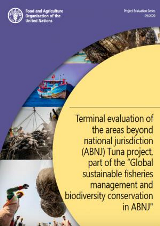
Terminal evaluation of the areas beyond national jurisdiction (ABNJ) Tuna project, part of the "Global sustainable fisheries management and biodiversity conservation in ABNJ"
24/09/2020
The ABNJ Tuna project, one component of the Common Oceans ABNJ Programme, promoted important transformational changes in the management practices of tuna fisheries, improving their sustainability, strengthening Marine Stewardship Council capabilities of tuna regional fisheries management organizations (t-RFMOs) and their members, and significantly reducing their impact on biodiversity.
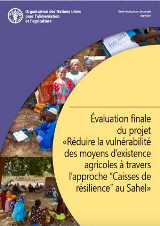
Final evaluation of the project "Reducing the vulnerability of agricultural livelihoods through the Caisses de Résilience approach in the Sahel"
15/09/2020
The overall objective of the project was to improve the food and nutritional security of vulnerable populations in Burkina Faso and Mali by strengthening the resilience of their livelihoods in the face of climatic hazards. The final evaluation of the project was carried out between April and May 2019. (French only)
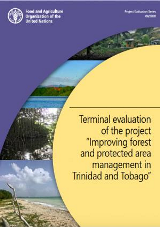
Terminal evaluation of the project “Improving forest and protected area management in Trinidad and Tobago”
14/09/2020
This report presents the main findings from the terminal evaluation of the project. The project, funded by GEF and implemented by FAO, sought to conserve globally important biodiversity and ecosystems in Trinidad and Tobago. The evaluation focuses on results achieved, it identifies the impact of the project, the sustainability of project outcomes and the degree of achievement of the outcomes in the long-term.
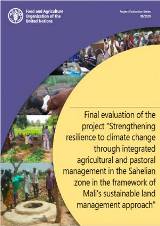
Final evaluation of the project "Strengthening resilience to climate change through integrated agricultural and pastoral management in the framework of Mali's sustainable land management approach"
14/09/2020
Mali is currently facing many challenges due to climate change which significantly affects all communities in the country, and agricultural producers in particular. In order to address these climate challenges, the project aimed to strengthen the capacities of agro-pastoralists in the districts of Banamba, Kita and Niono to help them cope with climate change. (French only)
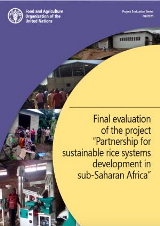
Final evaluation of the project “Partnership for sustainable rice systems development in sub-Saharan Africa”
08/09/2020
FAO implemented the project from May 2014 to December 2019, with the ten ministries of agriculture from the beneficiary countries. The project goal was to develop sustainable and productive rice systems in Africa to increase food security and enhance sustainable development of the rice food chain among smallholder farmers.

Mid-term evaluation of the project "Monitoring water productivity by remote sensing as a tool to assess possibilities to reduce water productivity gaps"
04/08/2020
The project is essentially focussed on the setting and implementation of a digital database built upon remote sensing and information technologies that can monitor and report on agricultural water productivity over Africa and Near East, and accessible through the FAO Water Productivity through Open access of Remotely sensed derived data portal (WaPOR).

Final evaluation of the projects "Strengthening the processes of restitution of lands and territories" and "Resilient rural communities for the construction of peace"
03/08/2020
The final evaluation of the two projects aims to provide recommendations to support the implementation of the new project, “Territorial Transformation, Resilience and Sustainability”, which will unite the efforts of both projects evaluated. (Spanish only)

Final evaluation of the project “Adaptive management and monitoring of the Maghreb’s oases systems”
29/07/2020
The Maghreb's oases systems provide a major contribution to the region's food security, economy and natural resources. Despite this potential, oasis ecosystems are threatened by a range of complex factors related to the expansion of agricultural land and increasing scarcity of water resources.

Final evaluation of the project “Conservation of biodiversity and mitigation of land degradation through adaptive management of agricultural heritage systems"
28/07/2020
The biodiversity enjoyed by Morocco, including its oasis systems, is threatened. The Global Environment Facility (GEF) alongside the government has embarked on a project to improve the conservation and sustainable management of five oasis systems.

Mid-term evaluation of “Participatory assessment of land degradation and sustainable land management in grassland and pastoral systems”
27/07/2020
Grasslands and rangelands make an important contribution to the maintenance of an ecosystem’s function and biodiversity. Degradation is one of the main problems faced by these resources globally. This project was implemented from 2017 to 2021 in Burkina Faso, Kenya, Kyrgyzstan, the Niger, and Uruguay.
